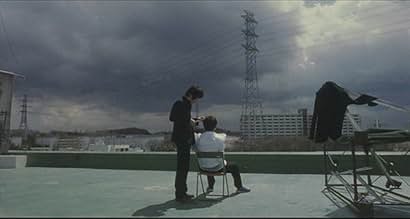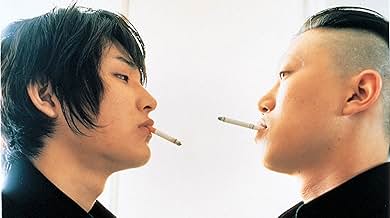If one pays scant attention to the news in Japan, seen Iwai Shunji's _All About Lily Chou Chou_, or read short stories and novels by Murakami Ryu, one knows that Japan, like other countries, suffers from an escalation of violence in schools. This violence works in three ways: student vs. teacher, teacher vs. student, and, the most common, student vs. student. Although it is still rare, the newspapers and news programs are peppered with stories of bullies beating someone to death or the bullied killing his bullies. Murakami Ryu and Yu Miri have both focused on these subjects in their literary works. Toyoda Toshiaki, through his film _Blue Spring_ also touches on this controversial subject.
The kids attending the all boys Asahi High School would basically be considered the dregs of Japanese society. The school is rundown and the teachers teach such a drypan, apathetic manner that it is not surprising that the kids could care less. The only teacher who seems to actually care about any of his students is a dwarf who waters the flowers on the school grounds all day.
However, although the teaching might be unstructured, there is a rigid code of hierarchy enforced by the tough kids. A leader is chosen by a suicidal ritual in which a student claps his hands as many times as possible while falling backwards. After he claps a certain amount of times, he grabs the guardrail. Miss the guardrail, instant pancake.
At the beginning of this film, after the "graduation" of the senior class, Kujo, played by the extraordinarily handsome Matsuda Ryuhei, wins the contest. Kujo is a bit indifferent to his new found power, but goes along with it because he has the support of his friends: Aoki, Yukio, Yoshimura, and Kimura.
Although many of the students are not satisfied with the way their lives are shaping, they seem to basically concede that good jobs and college are not in their future and that they are either on the track to become either a menial laborer or a member of the Yakuza.
_Blue Spring_ is an interesting film that depicts individuals who are not on the "normal road of becoming a good Japanese citizen": i.e. Graduation, work, stable family. It shows the dregs, but the dregs also show that social hierarchy exists from the lowest to the highest.
I think that the film is quite well done. The filming is dark, but it fits the atmosphere of the film. The soundtrack is excellent.











